Photo by Zhanhui Li on Unsplash
My town has always had a good track record of getting its smartest students into the Ivy League colleges, but parents tell me that those kids aren’t getting into the most elite college anymore. Now, those kids are still doing really well. Maybe they are going to Dartmouth or University of Michigan instead of Princeton. And the students who used to go to Dartmouth or University of Michigan are now going to still really great colleges, just one or two rungs down on the ranking ladder.
While the competition is heating up among the private colleges and flagship colleges — 72 of those schools have acceptance rates of less than 20 percent — other colleges are struggling to get warm bodies in the door. 1 in 5 students at community colleges aren’t even 18. They’re high school students looking for trade classes or advanced classes to prepare them for college.
A few years back, I wrote an article for The Atlantic about Sweet Briar College, a small, private college on the edge of bankruptcy. Since then things have gotten worse for those small colleges and community colleges, because they don’t have enough students to pay the tuition, while dealing with rising costs and dwindling donations. In the coming years, higher education is going to be marked by intensity at the top and closed doors at the bottom.
Talk to a parent with a college-bound senior today, and you’ll hear a lot of grumbling. Their kids aren’t getting into colleges that would have been do-able just a few years back. Students with great grades, AP scores, extracurriculars, SATs — the whole package — are attending schools that they would have considered “safeties” in the past.
They tell me that guidance counselors are advising students to not even bother applying to places like University of Virginia or North Carolina at Chapel Hill. Those schools aren’t even Ivy League colleges, but are still too tough for out-of-state students these days.
As someone with no horse in this race, it is a little hard to be super sympathetic. Those high performing kids are still going to fantastic colleges and will go on to have fabulous lives. But for these parents have prepared their young people for Yale and Princeton since birth, it feels like a tragedy. They feel like they’ve been cheated.
So, what’s going on? Why are things so tough at the top?
Well, several factors have heated up the competition at the most selective colleges. Online applications make it easier to apply than ever, so people do. All colleges now reserve a huge chunk of seats for super wealthy international students, who pay full-freight tuition and may donate a wing to the library, as well. There’s no doubt that family connections and influence play a big role in admissions, though that’s always been true.
Another problem — if it’s really a problem — is that there is an over abundance of well-honed, polished, tutored young people from certain communities. And all of those polish young people have super savvy parents, who know how to game the system.
Swimming in applications with “perfect students,” colleges are now looking for something different — a tuba player from Alaska, a math genius from Newark, a farm kid who sells crypto on the side. Getting 5’s on your AP exams and hitting homers for the baseball team is not enough anymore.
Now, what are the discontented families going to do? Are they are going to readjust their goals and expectations and learn to embrace a world without an Ivy League pedigree? Or are they going to find new ways to game the system and engineer perfect, yet quirky, young people, who will catch the eye of jaded admission directors? I’m not sure.
While the top 70-100 colleges have too many applications, other colleges are struggling. Those colleges are facing deep enrollment plunges, due to the pandemic shifts and demographic changes.
At a recent conference, panelists discussed to boost enrollment numbers by appealing to adult learners and by increasing diversity. One panelist commented on the new have-and-have-not landscape in higher edu:
“In terms of the four-year institutions, there’s this growing divide between the haves and have-nots … not just the well-funded institutions, but those that have a lot of brand power and ability to attract high-income and high-ability students,” he said. “The most selective institutions are getting stronger, and the smaller privates and regional publics are falling further and further behind.”
I’m not sentimental about preserving colleges that do not provide a product that is valued by the community. If those schools can’t get students in the door, then they’re doing something wrong. (I’ve written before about the problems at community colleges.) However, I do feel strongly that all communities need colleges — a place to retrain, to gain skills, and to grow. Education deserts create communities with no future.
Inequity in higher education creates inequity in society. The most elite colleges must increase seats to educate more young people. The less selective colleges have improve their support systems and really focus on meeting the needs of people in their communities.
LINKS and Brief Thoughts
A few weeks ago, I poo-pooed the impact of the Supreme Court decision on Affirmative Action at Harvard, because I said that admission directors have other tools in their belt for increasing diversity without specifically asking about race.
While I still think that the admissions directors at the top colleges won’t have any problems maintaining a diverse student body, I do think that the implication of that case is wider than I thought. This decision seems to have signaled to people in politics and the business world that DEI initiatives are done and diversity is no longer an important goal. Problematic.
At the Great Leap, I wrote about my friends who are considering moving to more disability friendly states:
America needs to stop relying on the choices made by elite colleges, Megan McArdle, WaPo
Is grad school worth it? New research shows students left with unmanageable debt, Alia Wong, USA Today
Watching: Finished the Nick Fury series on Disney+ with Ian, Going to see Oppenheimer on Saturday with my folks
Cooking: I’m a huge fan of using yesterday’s leftovers in today’s meal. I’ll take the chicken fat from yesterday’s roast chicken thighs and use it to sauté today’s collard greens. I’ll shred yesterday’s chicken — not enough to feed four — and add onions, beans, and taco flavoring. Tortillas and cheese. And it’s a new meal! That’s why I want to check out the leftover dumpling book.
Travel: Last weekend, we went up to the Catskills, ate a lot of food, and went to a great music festival. Thanks to my parents and Jonah for keeping an eye on Ian. This weekend, we’re staying local, going to a fun wedding, and catching up on campaign chores.






Maybe worth noting that 8 years later, Sweet Briar is still going, after drive-by punditry pronounced it inevitably dead. There is in that sense another side to the story for some of the small places that are struggling, which is incompetent or indifferent administrative leadership--in the years before the leadership tried to close the place down, they didn't have a development team trying to reach out to the alumni, they didn't have an admissions director or an admissions strategy that was looking for students and families that might prefer an all-woman's institution, and they weren't working with faculty to think about some kind of planned, coherent restructuring of the curriculum. Maybe some, by no means all, of the places that are in trouble are in trouble because they're badly led.
Moreover, every time folks announce an institution has closed and say "oh here comes the wave!", I go and look at the details, and so far it's almost never a conventional long-standing liberal arts college that's been in continuous operation for more than a century with more or less a stable identity. It's institutions that are much younger, that have renamed or rebranded themselves multiple times, that never really had much of a toehold to begin with, even in a very local market. I am sure that there are going to be some non-selective small colleges with little to no endowments that are going to go out of business in the next decade, but nothing like the 50% out of business predicted by Clayton Christensen, a number that a lot of pundits repeated credulously. Sometimes because they didn't know that Christensen was basically flacking for ed-tech companies that have a lot invested in the idea that higher ed is a failure and only ed-tech can save it with online courses; sometimes because the pundits are also flacking for them. The bloom being off the rose of online courses after we all got an involuntary taste of what they're like, the flacking has moved on to AI, but it's the same message.
Community colleges to me seem like the genuinely big story here--that's a place where my own predictive instincts have been consistently off. I don't really understand why they're seeing the precipitous drop that they are experiencing--they're still fairly affordable and they provide courses and degrees that have direct, tangible links to specific fields of work. It's possible that the main issue is one that Tressie McMillan Cottom wrote about in Lower Ed, which is that too many of them are still offering most of their courses when working students or students with families can't manage to take them. Another is maybe that everybody who thinks the answer is to have a very tight fit between post-secondary education and specific vocational training is wrong, either because the vocations aren't very appealing or we don't actually have a skills gap and a hungry labor market or because there is training that most CCs aren't offering that potential students would like to take. Or maybe the people who aren't enrolling in CC aren't enrolling in anything because they're giving up, or they're seeking work that doesn't require any kind of ongoing education or certification. But it's a major question.